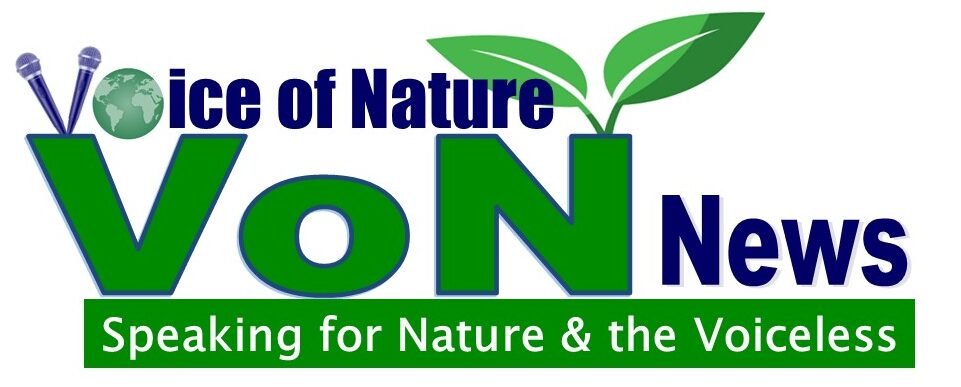By Aminateh Nkemngu
______________________
“ Debarcadeur” is a popular roast fish and sea foods joint in the seaside resort town of Kribi in the South Region of Cameroon. On this Saturday morning, at about 8 am, commuters, especially sea food vendors are already at work, cleaning their small compartments to begin roasting and selling seafood ,mostly different species of fish and shrimps.

As I and Randy Joe Sa’ah of BBC Africa Service observe how business of the day is unfolding, a teenage girl approaches us, and after greeting, she asks in French” can you come and chose your own sizes of fish, so I can start roasting”. Without waiting for an answer, she continues “ I am in shed 20, and I promise I will serve you a delicious plate”. We politely thank her and promise we would visit her shed very soon.
Adjacent to the compartment hosting the roast sea food vendors is the Mboa Manga fish market. Various species of fresh fish of different sizes are displayed on the concrete slabs on the ground. The sizes and quantities are visibly small, as the prospective buyers tussle over them. A lady who declines to “give her name to strangers” explains she sells shrimps and each time, she only manages to get the quantity she can get.
A day earlier ,Esther who runs a roast fish and beer business ,”Chez Esther” at the Village Du Mayi Cultural ground explains, the quantity of fish she is able to get cannot satisfy the increasing number of customers and tourists who pour into Kribi all the time. She immediately points out that local fishermen in the community are having a lot of challenges catching huge quantities of fish because they are foreigners using more advanced fishing vessels to rake the oceans, leaving the local fishermen with almost nothing.
This is why for four days, and as part of activities to mark the 2023 edition of World Oceans Day on 8 June, some 14 journalists from across Cameroon met in Kibi under the aegis of the Environmental Justice Foundation, a UK based NGO to reflect and gain new skills on raising awareness on the threats posed by irregular, unreported and unregulated fishing in Cameroon territorial waters on the livelihood of coastal communities and the economy of the country .This weeklong working session was also part of “ Street Whale”, a flagship event of the African Marine Mammals Conservation Organization, AMMCO a national NGO, that brings together experts and other stakeholders from Europe and across Africa to reflect and share knowledge on the state of the continent’s oceans and more particularly, the challenges facing ocean conservation in Cameroon.
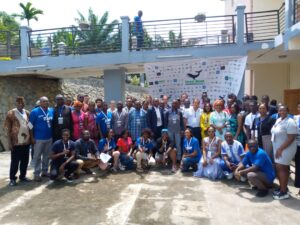
Cameroon Oceans; Tides Are Changing.
According to the Environmental Justice Foundation, EJF, “Illegal, Unreported and Unregulated (IUU) fishing is one of the most serious threats to the sustainable exploitation of the sea representing a major hazard to the marine environment. Cameroon is one of the African countries with the highest incidences of IUU fishing practices, which happens to be the most significant threat causing depletion of fish stocks, destruction of marine biodiversity through overfishing hence leading to an important economic loss. The leading causes of IUU fishing in Cameroon fisheries include: the non-alignment of fishery legislation with international laws, insufficient collaboration between administrations involved in fisheries management and a weak Monitoring Control and Surveillance (MCS) system”.
Research by EJF in 2022 found that 55% of the vessels in Cameroon’s fleet were added in the last five years. Even more strikingly, these vessels make up 90% of the total tonnage of the fleet, and 94% of the new vessels are owned by foreign, not Cameroonian, interests.
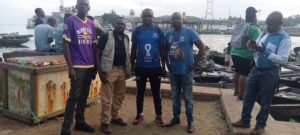
“However, ensuring the health of the fisheries and a safe maritime space domain is critical for the survival of coastal fishing communities, improving the human rights of fishing communities, workers, and the wider society. Furthermore, it will contribute to improving the economic fortunes of the country. Cameroon’s Ministry of Finance notes that in 2019, the fisheries sector contributed to 3% of the country’s US$39 billion Gross Domestic Product (GDP). It is projected to remain stable in the coming years. In addition, marine capture fishing operations account for 83% of fish production in the country. In that context, it is critical to secure legal and sustainable fisheries providing employment, economic opportunities, and contributing to food and social security. “
“Nonetheless, experience has shown that awareness of fisheries and maritime issues is minimal and that the majority of the population assumes that there will always be fish in our seas for consumption”, EJF concludes.
Dr Gordon Ajonina, Coordinator of the Cameroon Wildlife Conservation Society , CWCS, says “the main challenges faced by the marine and coastal zone are habitat degradation, pollution, poaching, illegal fishing, invasive plants, ignorance of the population and lack of appropriate legislation. To counteract these challenges it is important to involve the communities in the process, set up a management plan for Marine Protected Areas and revise the law to meet global standards. “
Dr Tedonzong Luc Roscelin of Traffic, explained that “illegal fishing as well as other crimes on biodiversity and by extension other types of crime are linked. The common points of convergence are the facilitators i.e. brokers, money launderers, accountants, client managers, document forgers, bankers, shipping logistics, customs clearance agents and freight forwarders. Working together will help stop these scourges.”
Guy Otete Bikimi of the National Control Brigade in Cameroon’s Ministry of Livestock Fisheries and Animal Husbandry explains that as far as industrial fishing ins concerned, illegal, unreported and unregulated fishing manifests in the form of “piracy, or fishing without licenses, which has been a big problem reported by major actors. More importantly because Cameroonians are not very involved in such type of fishing .And also, the use of illegal and unauthorized fishing equipment to fish in Cameroon territorial waters ,trans-border movement of fish harvested on Cameroon waters by industrial vessels but moved into artisanal canoes to avoid detection of their origin, clandestine sales and clandestine loading at sea. Fishing vessels in Douala dodging control posts at the Douala pot to offload their content at military port installations in Tiko and fishing within the 3 nautical miles limit”.
Otete continues that for artisanal fishing there is “the deployment of unauthorized fishing boats, used of unauthorized fishing nets, and at times even mosquito nets, use of explosives and fish poisoning ,which is very damaging to the coastal marine ecosystem, fraudulent trans-border loading and offloading with industrial vessels, use of unregistered boats and canoes, fishing without permits, illegal exportation of seafood, amongst others”
Two Fishes! One Fish! No Fish!

Guy Otete concludes that these have severe consequences such as “at social level ,destruction of the natural resources, drop in protein needs of population as recommended by the FAO, shortage of fish supplies in quantity and quality ,abandonment of fisheries sector by actors, non profitability of sector.
At the economic level ”IUU fishing does no only have a significant impact on the public investment budget of the economy by exerts pressures on the budget of individual households. So even households holds are left with two fishes, one fish, or no fish at all on their dining tables.”
“Regarding the public investment budget, illegal exports of fish create disequilibrium because it makes it difficult for the state to know the exact quantities of fish to import to meet local needs. This also negatively affects tax revenue gotten from inspection and exportation. There is also a hike in prices of fish products on the local market”
The “Red Card”
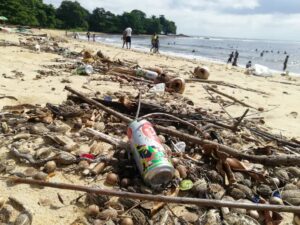
In January 2023,the European Union commission issued a “red card” on fisheries products from Cameroon, a sanction which, implies that the Member States of the European Union will refuse all products from Cameroonian fisheries, including those with catch certificates validated by the national authorities.
The European Commissioner for Fisheries, Virginijus Sinkevičius, blamed the authorities in Yaoundé for not having done enough in the last year to curb illegal fishing. According to him, Cameroon has even “continued to register fishing vessels operating outside its waters without any monitoring of their activities. This phenomenon is called “flag of convenience” and consists, for a State, in registering in its fleet vessels of foreign origin operating in most cases outside its waters without any real prior investigation or control over them. These flags are often used by operators to conceal their identity and avoid sanctions when they engage in illegal activities. According to research by Maurice Beseng of the University of Sheffield (UK), 70 industrial fishing vessels were active in Cameroon in 2021, most of them of Chinese or Nigerian origin. These vessels were known to operate in areas reserved for artisanal fishing. Such practices lead to the overexploitation and destruction of marine ecosystems while tarnishing the reputation of the Cameroonian flag. In 2017, the government of Cameroon estimated the total cost of illegal fishing at $33 million per year, representing a net loss of revenue for the country’s economy.
Towards Sustainable Fisheries.
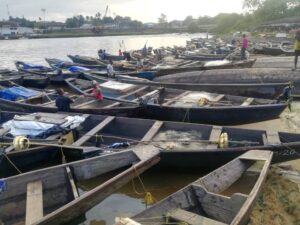
To reverse this trend ,the Environmental Justice foundation has made a set of recommendations to the Cameroon government amongst which are to “effectively enforce a moratorium on the registration of distant-water fishing and fishing-related vessels under the flag of Cameroon, deregister Cameroonian distant-water fishing and fishing-related vessels and inform all relevant authorities and bodies of the decision taken to deregister such vessels and close Cameroon’s international fishing and fishing-related registry, investigate any suspected IUU fishing and associated illegal activities involving Cameroonian fishing and fishing-related vessels and impose sanctions adequate in severity in respect of any confirmed violations and proactively share relevant information, complete the consolidation of the national registry of fishing and fishing-related vessels and upload relevant information on the FAO Global Record of Fishing Vessels, Refrigerated Transport Vessels and Supply Vessels and / or on the website of the MINEPIA, complete the revision of Cameroon’s fisheries legal and regulatory framework, ensuring it meets regional and international standards, Ratify and effectively implement relevant international and regional fisheries-related instruments such as the 2009 Agreement on Port State Measures, the 2007 Work in Fishing Convention and 2012 Cape Town Agreement. Achieve improved cooperation and dialogue between Cameroon and the relevant authorities, bodies and organizations.
Also the Cameroon government is also taking measures to reverse the trend ,some of which include” proper handling of he agreements on industrial fishing, closely monitoring artisanal fishing activities, equipment of control posts and improvement of technology based surveillance ,follow up of the records of fishing vessels, registration of vessels, implementation of the convention signed with the ministry of defense in 2013” amongst other measures.
In addition, within the framework of the FISH4ACP project, which aims to develop the potential of fisheries and aquaculture in Africa, the Caribbean and the Pacific, Cameroon is receiving support for the development of the shrimp fishing value chain. In 2021, Cameroon produced about 400 tons of shrimp (especially gambas, pink, gray and tiger shrimp, chosen because of their high export potential).
